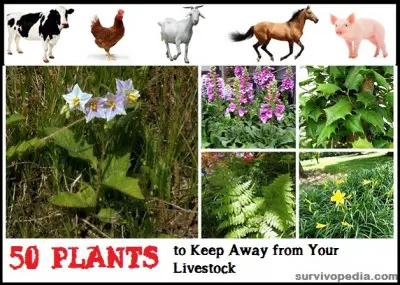This in depth look into 50 toxic plants to keep away from homesteading livestock animals is a great way to educate yourself into making your homestead a safe place.
Animals often aren’t aware of plants that are poisonous, just as most humans aren’t aware of the difference between edible mushrooms and poisonous ones. A lot of plants that, as a human, you may grow for food, medicine, or even just landscaping can be poisonous to your animals. Some plants you can buy at your local store will be plants that aren’t native to your area, and some are harmless, but some are invasive species. The animals I’ll be mentioning are cows, chicken, goats, horses, pigs, and sheep.
I’m going to start off with some plants that are poisonous to all livestock. Azalea and rhododendrons, begonia and daffodils, black locust, and holly are poisonous, not just parts of the plants, but the entire things.
Plants that are poisonous to farm animals:
Alfalfa, lucerne, red or white clover, birdsfoot trefoil, bleeding heart, dutchman’s breeches, squirrel corn boxwood, bracken fern, broccoli, buttercup, crowfoot, cabbage, celandine, cocklebur, chives, onions, nightshade, horse nettle, buffalo bur, corn cockle, delphinimus, larkspurs, dock weed, dogbane, delphiniums, elderberry, fiddleneck, flax, foxglove, digitalis, garlic mustard, golden chain, laburnum, halogeton, horse chestnut, buckeye, horsebrush, irises, Jimsonweed, downy thornapple, devil’s or angel’s trumpet, lamb’s quarters, lantana, verbena, lilies, locoweed, lupine, milkweed, mustard, oak trees, oleander, pigweed, poinsettia, spurges, snow on the mountain, pokeweed, sorghum, tall fescue, turnip, poppies, cherries, and yarrow. If you need a second opinion, Cornell University College of Agriculture and Life Sciences (click here)
Some plants have pollen that can contaminate water and other resources, which can be fatal to some animals even if they didn’t directly eat the plants. Therefore, plants that should be isolated in a greenhouse are azalea, begonia, dockweed, black locust, boxwood, foxglove, bracken fern, buttercup, horse nettle, chives, deiphinium, white clove, fescue, lamb quarters, and yarrow.
Aside from avoiding these plants, many native plants and weeds will need to be removed from grazing areas.
No matter how hard you try, there are going to be a few poisonous plants, because it’s impossible to keep them all out. Some plants can kill using just a few berries, however it’s important to remember that even if they don’t look very ill, emergency treatments may fail. To find out which treatments to use, if you find an animal has been poisoned, call your local poison control center.
While people may think they know about raising animals on a farm, many don’t realize how many poisonous plants there really are in nature, and may even put some in their farms because they look nice. That being said, now there’s one more person who knows what’s out there that can harm a farm.
Please LOOK BELOW to read the remaining part of the article.
Photo Source

Click here to read the source:
.

